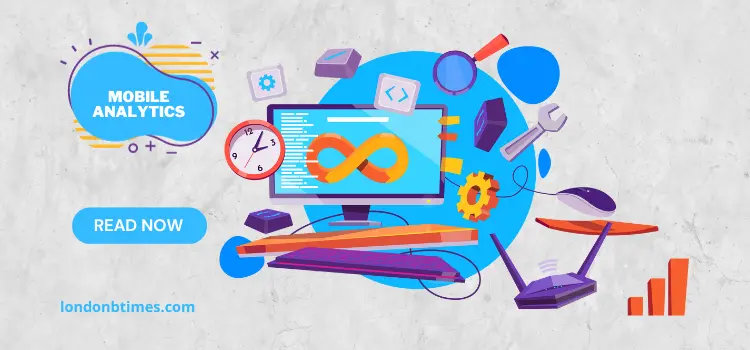Table of Contents
Mobile analytics serves as the cornerstone for enhancing the performance of mobile applications, ensuring a seamless user experience. In this comprehensive guide, we’ll explore the multifaceted impact of mobile apps analytics on various aspects of app performance optimization.
How Does Mobile Analytics Contribute to App Loading Speed Optimization?
In the realm of app performance, the loading speed is paramount. Mobile apps analytics provides invaluable insights into the factors influencing loading times. By analyzing data on user interactions and app behavior, developers can pinpoint bottlenecks and streamline the loading process. This optimization not only enhances user satisfaction but also contributes to lower bounce rates, which is crucial for the success of any mobile application.
When considering mobile analytics tools, it’s essential to choose those that offer real-time data on loading speed metrics. It allows developers to make prompt adjustments and continuously refine the app’s performance.
What Role Does User Behavior Analysis Play in App Performance Enhancement?
Understanding user behavior is at the heart of creating a high-performance mobile app. Mobile analytics tools enable developers to delve into user interactions, navigation patterns, and feature usage. By comprehending how users engage with the app, developers can tailor optimizations to align with user preferences.
User behavior analysis is not only about identifying popular features but also recognizing potential pain points. Adjustments based on this analysis contribute significantly to improved app responsiveness and overall performance.
Optimizing Resource Usage: What Insights Can Mobile Analytics Provide?
Efficient resource allocation is pivotal for an app’s smooth operation. Mobile apps analytics offers deep insights into resource usage patterns, identifying areas where optimization is possible. By analyzing data on CPU usage, memory consumption, and network activity, developers can make informed decisions on resource allocation, leading to improved app stability and responsiveness.
Utilizing mobile analytics tools that provide granular details on resource consumption empowers developers to strike the right balance, ensuring optimal performance without unnecessary strain on device resources.
How Can Mobile Analytics Identify and Rectify App Crashes and Errors?
App crashes, and errors can significantly impact user satisfaction. Mobile analytics tools play a critical role in identifying the root causes of crashes and errors. By tracking error rates, monitoring exception reports, and analyzing crash logs, developers gain visibility into issues that may otherwise go unnoticed.
In the quest for robust performance, it’s essential to choose mobile apps analytics tools equipped with advanced error-tracking capabilities. These tools empower developers to swiftly identify, diagnose, and rectify issues, contributing to a more stable and reliable app.
Network Performance: What Metrics Should You Monitor in Mobile Analytics?
For mobile apps heavily reliant on network connectivity, monitoring network performance is paramount. Mobile analytics provides a wealth of metrics related to network requests, response times, and latency. Analyzing this data enables developers to optimize network usage, minimize data transfer, and enhance the app’s responsiveness, especially in scenarios with varying network conditions.
Choosing mobile analytics tools with comprehensive network performance monitoring capabilities ensures that developers have the necessary insights to refine their app’s behavior in diverse network environments.
User Interface Optimization: Leveraging Mobile Analytics for Design Improvements
A well-designed user interface (UI) is a key element in app performance optimization. Mobile analytics allows developers to evaluate user interactions with different UI elements, helping identify areas for improvement. By analyzing heatmaps, click-through rates, and navigation paths, developers can optimize the UI to enhance user engagement and streamline the overall user experience.
Incorporating mobile analytics tools with robust UI analysis features provides developers with the necessary data to make informed design decisions, creating a visually appealing and user-friendly app.

Battery Efficiency: What Strategies Can Mobile Analytics Uncover?
Battery drain is a common concern for mobile users. Mobile apps analytics comes to the rescue by offering insights into the app’s impact on device battery life. Developers can analyze data on energy consumption, identify power-hungry features, and implement optimizations to enhance battery efficiency.
When selecting mobile analytics tools, prioritizing those that provide detailed battery usage metrics ensures that developers have the information needed to implement strategies for minimizing the app’s impact on device battery life.
App Responsiveness: Utilizing Analytics to Enhance User Interaction Speed
App responsiveness is a critical factor in user satisfaction. Mobile analytics plays a vital role in assessing and improving responsiveness by tracking user interactions and app response times. By analyzing data on touch events, gestures, and UI interactions, developers can identify areas where optimizations can be applied to ensure swift and seamless user experiences.
Opting for mobile analytics tools that offer real-time data on app responsiveness metrics empowers developers to proactively address issues, creating a more responsive and engaging app.
Data Efficiency: How Can Mobile Analytics Minimize Data Consumption?
In an era where data costs and limitations are considerations for users, optimizing data efficiency is crucial. Mobile analytics provides insights into how the app consumes data, allowing developers to identify opportunities for optimization. By analyzing data transfer rates, payload sizes, and caching strategies, developers can implement measures to minimize data consumption without compromising app functionality.
When selecting mobile analytics tools, prioritizing those with robust data efficiency monitoring capabilities ensures that developers can strike the right balance between app performance and data usage.
Real-time Monitoring: What Is the Significance of Immediate Performance Insights?
Real-time monitoring is instrumental in addressing performance issues promptly. Mobile analytics tools that offer real-time insights into key performance metrics enable developers to detect and respond to issues as they occur. This proactive approach ensures a faster resolution of potential problems, minimizing the impact on user experience.
For developers, choosing mobile apps analytics tools with real-time monitoring capabilities is essential for maintaining the highest standards of app performance and user satisfaction.
Frequently Asked Questions (FAQs)
Why is Mobile Analytics Important for App Performance Optimization?
Mobile analytics is crucial for app performance optimization as it provides developers with actionable insights into user behavior, resource usage, and potential issues. These insights enable informed decisions that contribute to a smoother and more efficient app experience.
What Key Metrics Should I Focus on in Mobile Analytics for Performance?
Key metrics for performance optimization in mobile analytics include loading speed, user behavior, resource usage, error rates, network performance, UI interactions, battery efficiency, app responsiveness, data consumption, and real-time monitoring.
How Can Mobile Analytics Help Identify and Resolve App Crashes?
Mobile analytics tools track error rates, exception reports, and crash logs, providing developers with the necessary information to identify and resolve app crashes. This proactive approach contributes to a more stable and reliable app.
What Impact Does User Behavior Analysis Have on App Performance?
User behavior analysis in mobile analytics guides developers in understanding how users interact with the app. This knowledge is instrumental in tailoring optimizations to align with user preferences, leading to improved app responsiveness and overall performance.
Are There Specific Tools or Platforms Recommended for Mobile Analytics?
Several mobile analytics tools are highly recommended, including Google Analytics for Mobile, Firebase Analytics, Mixpanel, and Localytics. The choice depends on specific requirements, such as the need for real-time monitoring, in-depth user behavior analysis, or comprehensive error tracking.
How Does Mobile Analytics Contribute to Battery Efficiency in Apps?
Mobile analytics offers insights into an app’s impact on device battery life by providing data on energy consumption. Developers can analyze this information to identify power-hungry features and implement optimizations, contributing to enhanced battery efficiency.
What Measures Can Mobile Analytics Suggest for Network Performance Improvement?
Mobile analytics tools provide metrics related to network requests, response times, and latency. By analyzing this data, developers can optimize network usage, minimize data transfer, and enhance the app’s responsiveness, especially in scenarios with varying network conditions.
Can Mobile Analytics Assist in Improving App Responsiveness?
Yes, mobile analytics is instrumental in improving app responsiveness by tracking user interactions and app response times. This data allows developers to identify areas for optimization, ensuring a more responsive and engaging user experience.
Are There Real-time Monitoring Solutions Integrated with Mobile Analytics?
Yes, several mobile analytics tools offer real-time monitoring capabilities. These tools provide immediate insights into key performance metrics, enabling developers to detect and respond to issues as they occur, ensuring a faster resolution of potential problems.
How Does Mobile Analytics Support App Design and User Interface Optimization?
Mobile analytics supports app design and user interface optimization by providing data on user interactions, navigation patterns, and feature usage. Developers can analyze this information to optimize the UI, creating a visually appealing and user-friendly app.
In conclusion, the significance of mobile analytics in app performance optimization cannot be overstated. By leveraging the insights provided by these tools, developers can enhance loading speed, analyze user behavior, optimize resource usage, rectify errors, monitor network performance, improve UI, enhance battery efficiency, ensure app responsiveness, minimize data consumption, and implement real-time monitoring. For the latest trends and tools in mobile analytics, stay informed with updates from LondonBTimes.com.




